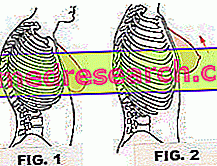
What is Envarsus - Tacrolimus and what is it used for?
Envarsus is a medicine containing the active substance tacrolimus, used for the long-term treatment of adult patients who have had a kidney or liver transplant, to prevent rejection (a phenomenon in which the patient's immune system attacks the transplanted organ). Envarsus can also be used to treat organ rejection in adult patients in whom therapy with other immunosuppressive drugs (medicines that reduce the activity of the immune system) is not effective. Envarsus is a "hybrid" medicine. This means that Envarsus is similar to a "reference medicine" that contains the same active ingredient, but is commercially available with a different formulation and in different dosages. The reference medicine for Envarsus is Advagraf
How is Envarsus - Tacrolimus used?
Envarsus can only be obtained with a prescription and should only be prescribed by physicians experienced in immunosuppressive therapy and in the management of transplant patients. Any transition to an alternative immunosuppressive therapy or any changes to existing therapy should only be made by decision and under the supervision of a transplant specialist. Envarsus is available as prolonged-release tablets containing tacrolimus (0.75, 1 and 4 mg). These "extended release" tablets allow tacrolimus to be released slowly from the tablet over a few hours, in a format that the body can easily absorb. In this way it is possible to administer the medicine only once a day. The doses of Envarsus are calculated based on the weight of the patient. In the prevention of rejection, the initial dose is 0.17 mg per kg of body weight per day in kidney transplant patients and 0.11-0.13 mg per kg body weight per day in transplant subjects liver. You can try to use these initial doses also for the treatment of rejection. Your doctor should monitor the levels of tacrolimus in your blood to check that they do not exceed certain limits. Treatment is adjusted according to the blood levels of the medicine and the patient's response. The dose may need to be reduced in patients with impaired liver function. Black patients may need higher doses than white subjects. Since the body's absorption of tacrolimus occurs in different ways for Envarsus compared to other tacrolimus-based medicines, the dose of Envarsus in patients transferred from any other formulation of tacrolimus must be 30% lower than the existing dose . Envarsus should be taken once a day with a glass of water on an empty stomach. Envarsus is often given with other immunosuppressive drugs after transplantation. For more information, see the package leaflet.
How does Envarsus - Tacrolimus work?
Tacrolimus, the active ingredient in Envarsus, is an immunosuppressive agent. Tacrolimus reduces the activity of some particular cells of the immune system, called T lymphocytes, which are responsible for aggression to the transplanted organ (ie organ rejection).
What benefit has Envarsus - Tacrolimus shown during the studies?
As Envarsus is similar to the reference medicine Advagraf, the applicant submitted comparative data on Advagraf. Furthermore, in view of the formulation / dosage differences between Envarsus and Advagraf, clinical studies conducted on patients were also provided. These studies compared Envarsus with Prograf, a widely used and proven tacrolimus medicine that provides a faster release of tacrolimus. Envarsus has been shown to be at least as effective as Prograf in two main studies conducted on kidney transplant patients. In both studies the main measure of effectiveness was the number of patients in whom there was a therapeutic failure (death, functional failure or rejection of the transplanted organ, or abandonment of the patient's follow-up) after 12 months . The first study involved 326 patients already undergoing kidney transplantation and currently being treated with Prograf and other immunosuppressive drugs to prevent rejection. Patients were transferred to Envarsus treatment once a day or continued to take Prograf therapy twice a day. In both groups there was a failure rate of 2.5% (4 of 162 patients treated with Envarsus and 4 of 162 treated with Prograf). The second study compared Envarsus with Prograf as part of a standard therapy conducted on 543 patients who recently underwent kidney transplantation. There was therapeutic failure in 18.3% of subjects treated with Envarsus (49 of 268) and in 19.6% of patients treated with Prograf (54 of 275). The company also provided studies on the levels of tacrolimus in the body after taking Envarsus, which showed that the medicine produced levels of tacrolimus that had previously been shown to be effective in treating and preventing rejection. Positive results were also reported in 29 patients treated with Envarsus immediately after a liver transplant, in which there was no rejection of the transplanted organ within 360 days after transplantation.
What is the risk associated with Envarsus - Tacrolimus?
The most common side effects with Envarsus (which may affect more than 1 in 10 people) are tremor, headache, nausea, diarrhea, kidney problems, hyperglycaemia (increased blood glucose), diabetes, hyperkalemia (increased rate blood potassium), hypertension (high blood pressure) and insomnia. Abnormal results can also be collected in liver function tests. For the full list of all side effects reported with Envarsus, see the package leaflet. Envarsus must not be used in patients who are hypersensitive (allergic) to tacrolimus or to any of the other ingredients or to people allergic to substances called "macrolides" (among which there are antibiotics such as erythromycin).
Why has Envarsus - Tacrolimus been approved?
The Agency's Committee for Medicinal Products for Human Use (CHMP) has decided that the approved doses of Envarsus have been shown to have a comparable quality, safety and efficacy profile to Advagraf and Prograf. Therefore, the CHMP considered that, as in the case of other authorized forms of tacrolimus, the benefits outweigh the identified risks. The committee recommended the granting of a marketing authorization for Envarsus
What measures are being taken to ensure the safe and effective use of Envarsus - Tacrolimus?
A risk management plan has been developed to ensure that Envarsus is used as safely as possible. Based on this plan, safety information has been added to the summary of product characteristics and the package leaflet for Envarsus, including the appropriate precautions to be taken by healthcare professionals and patients. In addition, the company that markets Envarsus will provide additional information material to healthcare professionals who can prescribe and distribute Envarsus, recalling their uses and authorized doses, and stressing the need to pay attention when switching to alternative formulations of tacrolimus. Further information is available in the summary of the risk management plan.
More information on Envarsus - Tacrolimus
On 18 July 2014, the European Commission issued a marketing authorization for Envarsus, valid throughout the European Union. For more information about treatment with Envarsus, read the package leaflet (also part of the EPAR) or contact your doctor or pharmacist. Last update of this summary: 07-2014.



